More than 2,800 professional registrants joined the Society’s virtual 58th Annual Meeting, January 29-30. To read articles from the STS Daily Bulletin, visit sts.org/annual-meeting-archive.
Presidential Address Urged Factoring Satisfaction into Success to Find the Right Fit
Sean C. Grondin, MD, MPH, FRCSC, closed his term as STS President with an address to STS 2022 attendees describing the evolving process of finding career fit. He relayed the concepts of understanding one’s own metrics of success and satisfaction to an assembly of live attendees who joined virtually from across the globe.
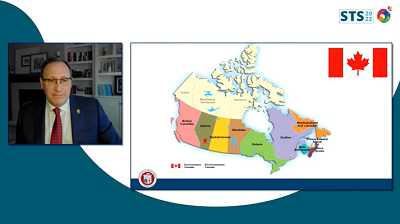
In his presentation, Dr Grondin shared lessons learned over his career related to professional success and satisfaction and how these two forces can work together to create professional “fit.”
“A position can look good on paper and tick all the boxes,” Dr. Grondin said. “You can be doing the job well; you can be a strong member of a strong team. It can all look good from the outside. But if it doesn’t feel right, it likely isn’t.”
He illustrated to the audience that in finding the right fit, surgeons need to not only rely on standard metrics of success that are often used for promotion, but also to consider other factors that contribute to one’s own personal sense of fulfillment and satisfaction.
Dr. Grondin went on to describe that the price of poor fit and low levels of satisfaction can sometimes be high, and over time they may be among the contributing factors that lead to burnout among cardiothoracic surgeons.
An STS member for more than 20 years, Dr. Grondin reflected that being part of the STS community has contributed greatly to his overall career satisfaction. He expressed gratitude to a long line of surgeon mentors, including Douglas J. Mathisen, MD, who many years ago challenged him to seek greater benefit from the organization by becoming more actively involved in the Society.
“Building a successful and satisfying career requires self-awareness and frequent self-evaluation,” Dr. Grondin concluded. “It requires paying attention to the things that bring you satisfaction, and finding fit is worth the effort.”
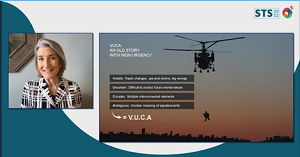
Amy C. Edmondson, PhD, presented the Thomas B. Ferguson Lecture during STS 2022.
Plenary Sessions Celebrated Diversity, Bravery, Psychological Safety
STS 2022’s plenary sessions allowed attendees to come together as a community in real time, with lectures exploring psychological safety in the workplace, the wartime lessons of a surgeon soldier, and the revelation that diversity can save academic medicine.
Henri R. Ford, MD, MHA, delivered the Vivien T. Thomas Lecture, in which he illustrated how disparities among Black and Latino populations in the United States have a precipitous effect on medicine—academic medicine in particular—and how solutions to existing health disparities will require a more racially, ethnically, and culturally diverse research workforce.
Racial disparities are dragging down efforts to address impending shortages of physicians in various specialties, Dr. Ford explained. He presented compelling statistics that reveal how education opportunities—afforded and missed—from childhood onward can have a cumulative effect on an individual’s success.
Thomas B. Ferguson Lecturer Amy C. Edmondson, PhD, shared insights from her groundbreaking work on psychological safety in the workplace. She described how cultivating a team that feels they can openly and honestly speak up can create a professional environment that moves beyond “just get it right” and makes strides toward excellence.
“We’ve got to learn to welcome the discoveries and do our very best to prevent the mistakes and accidents,” Dr. Edmondson said.
A stance of humility and of openness to feedback can help foster a psychologically safe environment, she continued. “Any person in an operating room might see something that you miss. A patient’s family member might notice that something seems wrong. Anyone’s voice can be mission-critical.”
During the C. Walton Lillehei Lecture, Cameron D. Wright, MD, Army Medical Corps, USAR (ret.), shared unforgettable experiences and lessons learned while caring for servicemembers and civilians.
Dr. Wright took attendees on a journey through his time served, painting vivid pictures of the physical and political climate during tours of duty in Iraq and Afghanistan. He also described several massive-severity wounds and hidden hazards that he “certainly never saw in surgical residency.”
He expressed his pride in serving alongside his son James, a Marine Corps machine gunner, in Iraq, and he touted the bravery of military dogs, some of whom he cared for in the trauma bay, and how soldiers paid them tribute for their service. Dr. Wright honored fellow military surgeons and pioneers—including the lecture’s namesake, C. Walton Lillehei, MD, PhD—and told stories of survivors as well as of those lost in conflict.
These lectures, along with a rich selection of additional STS 2022 content, is available via Annual Meeting Online—free to STS 2022 registrants and available for purchase to those who couldn’t attend. Visit sts.org/amonline for more information.
Award Winners Recognized for Outstanding Achievements
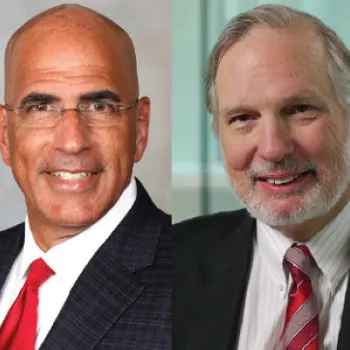
Distinguished Service Award
The Distinguished Service Award recognizes individuals who have made significant and far-reaching contributions to STS and the specialty. This year, Joseph A. Dearani, MD, and Joseph E. Bavaria, MD, each were honored for their extraordinary efforts and steadfast service.
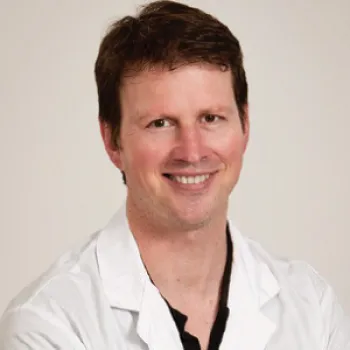
Earl Bakken Scientific Achievement Award
Internationally recognized medical researcher Thomas K. Waddell, MD, MSc, PhD, was presented with the Earl Bakken Scientific Achievement Award. Dr. Waddell is best known for his work in the fields of stem cell and regenerative medicine, lung and airway disease, as well as lung transplantation. The Bakken Award honors individuals who have made outstanding scientific contributions that have enhanced the practice of cardiothoracic surgery and patients’ quality of life.
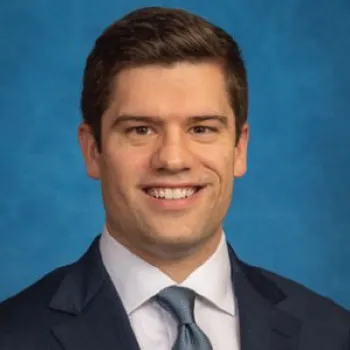
President’s Award
Michael J. Pienta, MD, MS, from the University of Michigan in Ann Arbor, received the 2022 President’s Award, for his paper, “Advancing Quality Metrics for Durable Left Ventricular Assist Device Implant.” Selected by the STS President, this award recognizes an outstanding scientific abstract by a lead author who is either a resident or a surgeon 5 years or less in practice.
STS 2022 Presentations Combat Health Disparities with Hard Data
During the STS Annual Meeting, faculty tackled inequities among different racial, gender, and socioeconomic groups, not only in patient populations but among the surgeons who provide their care.
“There are opportunities for intervention in health care and policy in addressing disparities to access—and in particular, in workforce diversity issues and capacity building,” said Hannah Valantine, MD, from Stanford University in California.
Dr. Valantine, who serves as chief officer for scientific workforce diversity at the US National Institutes of Health, gave an invited lecture during the Vivien T. Thomas Symposium, a series of STS Annual Meeting presentations which, in addition to the Vivien T. Thomas Lecture, aim to address challenges with diversity in cardiothoracic surgery.
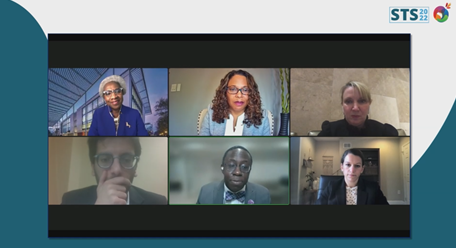
The Symposium and Lecture are named for Thomas, a black surgical technician who was instrumental in the landmark 1944 “blue baby” operation at The Johns Hopkins Hospital in Baltimore, Maryland—and who, in accordance with segregationist restrictions, was employed as a janitor and wasn’t allowed to use the front entrance of the hospital.
Alongside Dr. Valantine, three young researchers presented data underscoring why inclusion matters. Olugbenga T. Okusanya, MD, from Thomas Jefferson University in Philadelphia, Pennsylvania, outlined a study demonstrating that black race, Asian/Pacific Islander race, and insurance status had strong associations with patients deferring radiation therapy after surgery for non-small cell lung cancer.
In the realm of clinical trials, Gianmarco Cancelli, MD, from Weill Cornell Medicine in New York City, New York, revealed that only nine of 51 recent cardiac surgery trials reported the race of participants and, when race was reported, only 11.2% represented racial minorities. Future trials should either guarantee a balanced inclusion of racial minorities or be specifically designed to enroll them, Dr. Cancelli said.
It's not just patient inclusion that needs compulsory accountability, said Dr. Valantine, but also the physician workforce. She cited data illustrating that underrepresented scientists are more likely to study topics in disproportionately affected communities, and that in clinical research, quality is enhanced when the researchers are diverse themselves.
Physicians from underrepresented groups are twice more likely to work in underserved communities, and patients are twice more likely to adhere to medical advice when it’s given by providers of their own race, Dr. Valantine explained. “That’s where we need to take action,” she said. “We’ve come to the point that, in order to fix these problems, we have to fix our institutions.”
Also during this Symposium, Katherine A. Giuliano, MD, from The Johns Hopkins Hospital, presented survey results that illustrated subspecialization and work/life balance for women practicing cardiothoracic surgery.
Among the key findings were that, while 94% of congenital surgeons reported practicing in academia, none of the women who responded were full professors.
Data tracking—and incentivizing—is the first step toward culture change at institutions, said Dr. Valantine. She urged keeping records and acting on those records within an institution’s hiring and promotion policies, employing a central equity committee, and compelling department chairs to provide annual demographic data, with transparent reporting of positions and salaries broken down by gender and race. “It’s amazing how competitive departments can get and how that leads to action,” she said.
“Through a systematic way, you can identify candidates from a diverse talent pool,” she continued. “Do not accept the old adage that there’s nobody in the pool—we must not use that as the excuse for not having a diverse faculty or a diverse residency.”
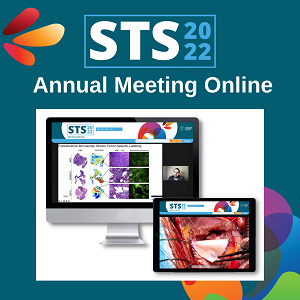
Access STS 58th Annual Meeting Online
If you were unable to attend the virtual Annual Meeting, or if you are looking for online learning opportunities, you now can purchase access to STS 58th Annual Meeting Online.
This digital product offers nearly 40 educational sessions—including practice changing research, thought-provoking lectures, and cutting-edge techniques and technologies—and the ability to earn up to 44.50 CME credits. Annual Meeting attendees receive free access to Annual Meeting Online.
STS members who did not attend STS 2022 receive a discount—and Resident/Fellow and Medical Student Members can access for free!
More details are available at sts.org/AMOnline.